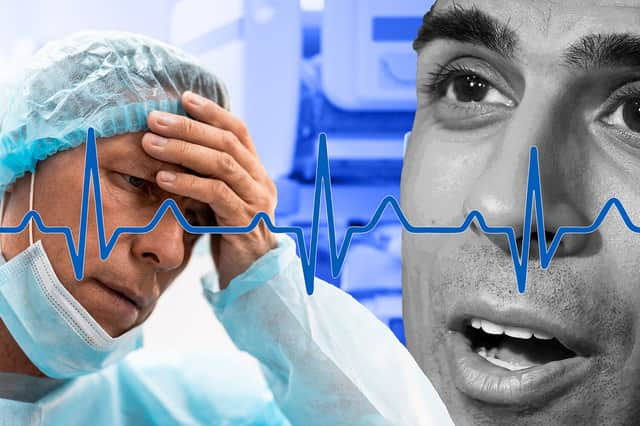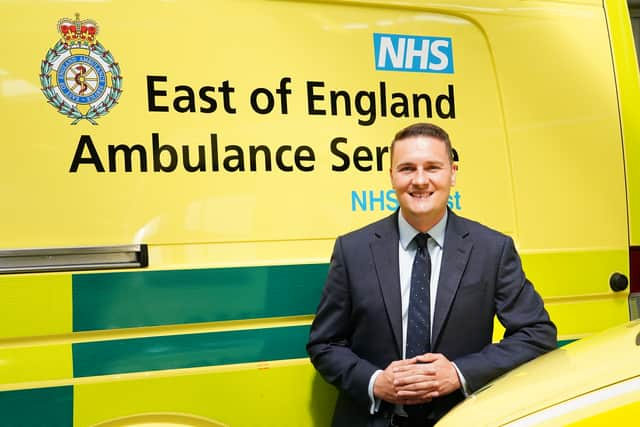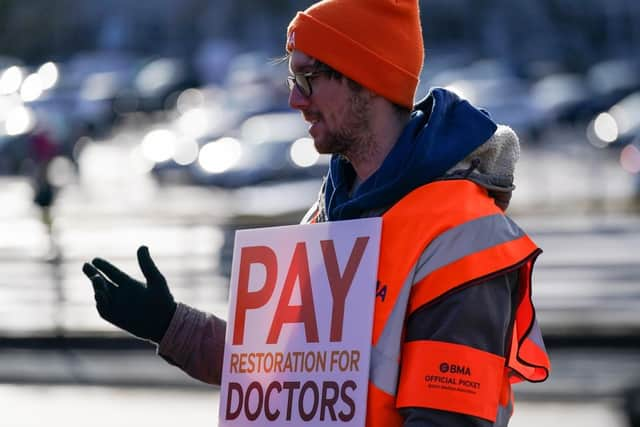NHS crisis: Rishi Sunak's promise falters as waiting lists in England hit record levels
and live on Freeview channel 276
NHS waiting lists in England have climbed to a record level placing more pressure on embattled Prime Minister Rishi Sunak.
New figures released on Thursday showed that 7.47 million people were waiting to start routine hospital treatment at the end of May, up from 7.42 million at the end of April. It is the highest number since records began in August 2007.
Advertisement
Hide AdAdvertisement
Hide AdAnd there are fears that waiting lists will struggle to come down with strikes ongoing. Today (13 July), junior doctors have started a five-day walkout with thousands of routine operations expected to be cancelled. After that, consultants and radiographers will strike - and hospital bosses fear that if the industrial action isn't solved by September, it will be impossible to reduce the wait list by the end of the year.
In January, Sunak set out the "five people's promises" - which he said voters should hold his government to account. He said: "NHS waiting lists will fall and people will get the care they need more quickly." This only refers to England, as health is devolved in Wales, Scotland and Northern Ireland.
So today's news is a major political headache for the Prime Minister - who wants to appeal to the electorate as someone who gets things done - as well as a huge health crisis. Sunak will have to get the waiting list below 7.2million, the number waiting in December 2022, if he wants it to fall from when he made that promise.
This is an easy attack line for Labour, and Shadow Health Secretary Wes Streeting said: "Rishi Sunak promised to cut waiting lists but they are now higher than ever before. Patients are waiting months and months for operations, only for them to be cancelled due to strikes. Rishi Sunak blames NHS staff, but the public know it’s his refusal to negotiate that is making the crisis in the NHS worse."


Advertisement
Hide AdAdvertisement
Hide AdAnd Tim Mitchell, vice-president and president-elect of the Royal College of Surgeons of England, said the climb in waiting lists is “disappointing but not unexpected”. “Despite the huge effort that NHS staff are putting in to get patients seen quickly, the situation remains challenging,” he added.
The figures make grim reading for the Prime Minister. In May, some 385,022 people had been waiting more than a year to start routine hospital treatment, up from 371,111 at the end of April.
During the same period, 11,446 people were estimated to have been waiting 18 months to start treatment, down slightly from 11,477. The government and NHS England have set the ambition of eliminating all waits of more than a year by March 2025.


Professor Sir Stephen Powis, NHS national medical director, said: “Every new month brings more evidence of record demand across many areas of NHS care with staff experiencing the busiest June ever for A&E attendances, no doubt exacerbated by the record high temperatures experienced for that month.
Advertisement
Hide AdAdvertisement
Hide Ad“This ongoing pressure on services is precisely why it is so important to highlight that staff continue to make progress in reducing the longest waits for care and in May despite strikes, high demand and three bank holidays, they treated record numbers of patients – almost 4.5 million people – within 18 weeks.”


Sir Stephen said the latest wave of strikes represents “an incredibly challenging period” for the NHS, adding: “So while staff will continue to work hard to provide patients with the care they need there is no doubt this period of action is likely to have the biggest impact yet.”
Mitchell added: “The longer patients remain on waiting lists, the longer they aren’t able to get on with their lives. In the most serious cases, patients will be unable to work and will need support to carry out the day-to-day tasks that most of us take for granted."
While the Nuffield Trust acting director of research, Dr Sarah Scobie, said: "Figures this morning on NHS performance and GP patient experience illustrate clearly that there will be no sudden return to the waiting times the public have been promised and still expect. Another 50,000 patients have been added to a waiting list for routine care or treatment that was already at record levels, bringing the total up to 7.47 million.
Advertisement
Hide AdAdvertisement
Hide Ad"Performance has stagnated at a lower level, with the recent hot weather and strikes impacting the ability of staff to drive down waits. The average waiting time for patients is continuing to increase with over half of patients waiting more than 14 weeks for treatment."
Earlier this month, Sunak said industrial action across the NHS is making it “more challenging” to bring down waiting lists. It is estimated that eight months of strikes has led to the cancellation or postponement of about 651,000 appointments and routine procedures.
There was some good news for the PM and Health Secretary Steve Barclay, as figures showed the number of people waiting more than 12 hours in A&E departments in England, from decision to admit to actually being admitted, was 26,531 in June, down 16% from 31,494 in May.
And the proportion of cancer patients who saw a specialist within two weeks of being referred urgently by their GP rose from 77.7% in April to 80.8% in May, but remained below the target of 93%.
However, the number of patients waiting longer than 62 days since an urgent GP referral for suspected cancer was 23,499 in the week ending May 28, up from 22,533 in the week ending April 30.
Comment Guidelines
National World encourages reader discussion on our stories. User feedback, insights and back-and-forth exchanges add a rich layer of context to reporting. Please review our Community Guidelines before commenting.
